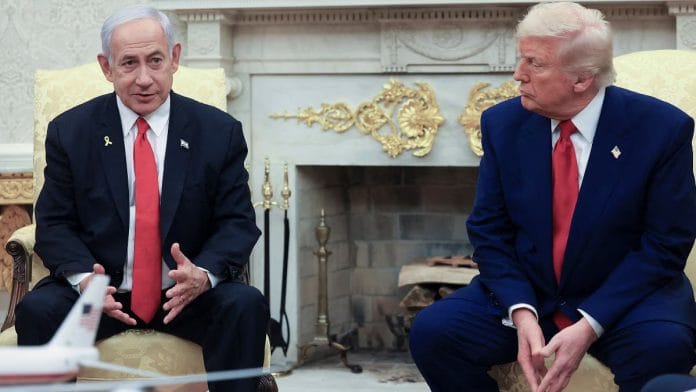In global politics and more so in the Middle East, even the most seasoned leaders can find themselves overtaken by events. Israeli Prime Minister Benjamin Netanyahu is learning this lesson the hard way. His once-advantageous relationship with Donald Trump now offers little protection as the US President charts a bold new course in the Middle East, without Israel at the centre of it.
Trump’s recent diplomatic outreach to Saudi Arabia, the UAE, and Qatar starkly excluded Israel. Unlike with Joe Biden, Barack Obama, or Bill Clinton—presidents whom Netanyahu felt comfortable confronting—he cannot openly criticise Trump without risking political backlash.
Weeks before Trump’s visit to Riyadh, Netanyahu was warned to expect surprises. He flew to Washington unannounced from Hungary, seeking exemptions from Trump’s sweeping tariff policy. He failed. Israeli exports were hit with an 18 per cent tariff, while Israel continues to offer American goods duty-free. Worse, Trump used the trip to signal a major pivot on Iran. Seated beside Netanyahu, he declared support for renewed negotiations with Tehran. Trump even dismissed his national security adviser, Michael Waltz, for coordinating too closely with Netanyahu and backing hardline positions.
This shift is especially jarring given Netanyahu’s claim to have personally convinced Trump to scrap the 2015 Iran nuclear deal—a landmark Obama-era accord. Now, Trump is quietly seeking a similar arrangement, this time to avoid direct military engagement.
On 6 May, Trump abruptly withdrew US backing for military operations against Yemen’s Iran-backed Houthis, leaving Israel exposed. After a successful missile strike on Ben Gurion Airport, major international airlines—including Air India—suspended flights. Trump made the decision unilaterally. Israel wasn’t even consulted.
Even on the emotionally and politically fraught issue of hostages in Gaza, Trump has bypassed Netanyahu’s government. His envoy, Steve Witkoff, secured the release of American-Israeli Edan Alexander through quiet diplomacy with Hamas. Neither Alexander nor his family publicly credited Netanyahu. Their thanks went entirely to Trump and Witkoff. “Israel is pointlessly extending the war,” Witkoff reportedly told hostage families in Jerusalem. Trump, who otherwise has let Witkoff criticise Netanyahu’s approach, later remarked, “I don’t know if [Netanyahu] can get the hostages out.”
A missed opportunity
Israel’s isolation has been one of the major challenges for its foreign policy since its inception. Arab States and their rejection of the UN partition plan in 1947 or later multiple wars created a deep sense of distrust and cynicism among Israelis. However, times have changed, and now Israel is missing out.
By refusing to end the war in Gaza or allow the Palestinian Authority a role in reconstruction, Netanyahu has squandered a rare diplomatic opportunity: normalisation with Saudi Arabia. Trump hoped to expand the 2020 Abraham Accords—which brought Israel into formal ties with the UAE, Bahrain, and Morocco—by bringing the Saudis into the fold. But Israeli intransigence has stalled that prospect. Ironically, Netanyahu is now losing a historic opportunity for peace.
This moment recalls a famous line by Abba Eban, Israel’s former foreign minister and one of its most articulate diplomats. In the wake of Arab rejection of the 1947 UN partition plan, Eban remarked that “the Arabs never miss an opportunity to miss an opportunity.” For decades, this quote was held up as a shorthand for Arab intransigence. But over time, many Arab States chose the path of peace: Egypt in 1978, Jordan in 1994, and several Gulf and North African states in 2020. Today, it is Israel, under Netanyahu’s leadership, that chose indefinite war in Gaza over diplomatic peace with the Arab states.
Last week in Riyadh, Trump signalled that he had moved on. “It’s my fervent hope, wish, and even my dream that Saudis will soon join the Abraham Accords,” he said. “They will join in their own time,” he added pointedly. The message was clear: Trump would not wait for Netanyahu.
Also read: How Israel won battles but lost public trust in 2024—from Hamas attacks to Nasrallah’s death
Why India should pay attention
For India, Netanyahu’s present miscalculations carry real strategic consequences. Flagship initiatives like the India–Middle East–Europe Economic Corridor (IMEC) and the I2U2 grouping (India, Israel, the UAE, and the US) rest on a fragile foundation of regional integration, economic interdependence, and diplomatic equilibrium. These ventures presumed that Israel would act as a stabilizing, forward-looking partner in multilateral settings. Netanyahu’s war-first approach—marked by the protracted bombing of Gaza, the alienation of Arab partners and European de-escalation efforts—risks unraveling these assumptions.
India has offered Israel unwavering rhetorical support in its war against Hamas, but it has so far refrained from reversing its long-standing endorsement of the two-state solution. Foreign Minister S. Jaishankar articulated this delicate balancing act: “On terrorism, we are with Israel; on a Palestinian state, we are with the Palestinians”, while he addressed the Munich Summit in February 2024. Yet this fence-sitting may soon be tested as Israel expands its military operations in Gaza.
Prime Minister Narendra Modi famously told Russian President Vladimir Putin, “This is not an era of war”—a moral admonition that Putin disregarded in his invasion of Ukraine. It’s a principle India would do well to apply consistently, even with friendly regimes. As a rising power invested in global multipolarity and rules-based order, India cannot afford selective silence when strategic partners undermine peace. Doing so weakens not only India’s normative voice, but also the geopolitical architecture it is trying to help shape.
Khinvraj Jangid is Associate Professor and Director, Centre for Israel Studies, OP Jindal Global University, Sonipat. He is visiting faculty at Ben-Gurion University of the Negev, Israel. Views are personal.
(Edited by Ratan Priya)







Going beyond PM Netanyahu, whose term is drawing to a close, one could never understand the rationale for I2U2. India has good relations with Israel, Saudi Arabia, Iran, three major poles of influence in the region. Also UAE, which punches above its weight. Nine million guest workers in Muslim countries, apart from imports of oil and natural gas. So the traditional policy of not getting involved in internecine squabbles has served India well.